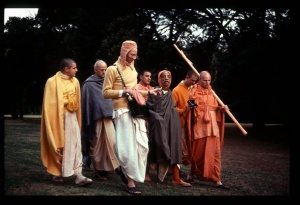BG 2.15: Difference between revisions
m (1 revision(s)) |
(Vanibot #0054 edit - transform synonyms into clickable links, which search similar occurrences) |
||
| (One intermediate revision by one other user not shown) | |||
| Line 1: | Line 1: | ||
{{ | [[Category:Bhagavad-gita As It Is (1983+) - Chapter 02]] | ||
<div style="float:left">'''[[Bhagavad-gita As It Is (1983+)]] - [[BG 2 (1983+)|Chapter 2: Contents of the Gita Summarized]]'''</div> | |||
<div style="float:right">[[File:Go-previous.png|link=BG 2.14]] '''[[BG 2.14]] - [[BG 2.16]]''' [[File:Go-next.png|link=BG 2.16]]</div> | |||
{{CompareVersions|BG|2.15|BG 1972|BG 1983+}} | |||
{{RandomImage}} | |||
==== TEXT 15 ==== | ==== TEXT 15 ==== | ||
<div class="devanagari"> | |||
:यं हि न व्यथयन्त्येते पुरुषं पुरुषर्षभ । | |||
:समदुःखसुखं धीरं सोऽमृतत्वाय कल्पते ॥१५॥ | |||
</div> | |||
<div | <div class="verse"> | ||
:yaṁ hi na vyathayanty ete | |||
:puruṣaṁ puruṣarṣabha | |||
:sama-duḥkha-sukhaṁ dhīraṁ | |||
:so 'mṛtatvāya kalpate | |||
</div> | </div> | ||
==== SYNONYMS ==== | ==== SYNONYMS ==== | ||
<div class="synonyms"> | |||
<div | ''[//vanipedia.org/wiki/Special:VaniSearch?s=yam&tab=syno_o&ds=1 yam]'' — one to whom; ''[//vanipedia.org/wiki/Special:VaniSearch?s=hi&tab=syno_o&ds=1 hi]'' — certainly; ''[//vanipedia.org/wiki/Special:VaniSearch?s=na&tab=syno_o&ds=1 na]'' — never; ''[//vanipedia.org/wiki/Special:VaniSearch?s=vyathayanti&tab=syno_o&ds=1 vyathayanti]'' — are distressing; ''[//vanipedia.org/wiki/Special:VaniSearch?s=ete&tab=syno_o&ds=1 ete]'' — all these; ''[//vanipedia.org/wiki/Special:VaniSearch?s=puruṣam&tab=syno_o&ds=1 puruṣam]'' — to a person; ''[//vanipedia.org/wiki/Special:VaniSearch?s=puruṣa&tab=syno_o&ds=1 puruṣa]-[//vanipedia.org/wiki/Special:VaniSearch?s=ṛṣabha&tab=syno_o&ds=1 ṛṣabha]'' — O best among men; ''[//vanipedia.org/wiki/Special:VaniSearch?s=sama&tab=syno_o&ds=1 sama]'' — unaltered; ''[//vanipedia.org/wiki/Special:VaniSearch?s=duḥkha&tab=syno_o&ds=1 duḥkha]'' — in distress; ''[//vanipedia.org/wiki/Special:VaniSearch?s=sukham&tab=syno_o&ds=1 sukham]'' — and happiness; ''[//vanipedia.org/wiki/Special:VaniSearch?s=dhīram&tab=syno_o&ds=1 dhīram]'' — patient; ''[//vanipedia.org/wiki/Special:VaniSearch?s=saḥ&tab=syno_o&ds=1 saḥ]'' — he; ''[//vanipedia.org/wiki/Special:VaniSearch?s=amṛtatvāya&tab=syno_o&ds=1 amṛtatvāya]'' — for liberation; ''[//vanipedia.org/wiki/Special:VaniSearch?s=kalpate&tab=syno_o&ds=1 kalpate]'' — is considered eligible. | ||
</div> | </div> | ||
==== TRANSLATION ==== | ==== TRANSLATION ==== | ||
<div class="translation"> | |||
<div | |||
O best among men [Arjuna], the person who is not disturbed by happiness and distress and is steady in both is certainly eligible for liberation. | O best among men [Arjuna], the person who is not disturbed by happiness and distress and is steady in both is certainly eligible for liberation. | ||
</div> | </div> | ||
==== PURPORT ==== | |||
= | <div class="purport"> | ||
Anyone who is steady in his determination for the advanced stage of spiritual realization and can equally tolerate the onslaughts of distress and happiness is certainly a person eligible for liberation. In the ''varṇāśrama'' institution, the fourth stage of life, namely the renounced order (''sannyāsa''), is a painstaking situation. But one who is serious about making his life perfect surely adopts the ''sannyāsa'' order of life in spite of all difficulties. The difficulties usually arise from having to sever family relationships, to give up the connection of wife and children. But if anyone is able to tolerate such difficulties, surely his path to spiritual realization is complete. Similarly, in Arjuna's discharge of duties as a ''kṣatriya'', he is advised to persevere, even if it is difficult to fight with his family members or similarly beloved persons. Lord Caitanya took ''sannyāsa'' at the age of twenty-four, and His dependents, young wife as well as old mother, had no one else to look after them. Yet for a higher cause He took ''sannyāsa'' and was steady in the discharge of higher duties. That is the way of achieving liberation from material bondage. | |||
</div> | |||
<div | <div style="float:right; clear:both;">[[File:Go-previous.png|link=BG 2.14]] '''[[BG 2.14]] - [[BG 2.16]]''' [[File:Go-next.png|link=BG 2.16]]</div> | ||
__NOTOC__ | |||
</div> | __NOEDITSECTION__ | ||
__NOTOC__ | |||
Latest revision as of 15:25, 17 February 2024

A.C. Bhaktivedanta Swami Prabhupada
TEXT 15
- यं हि न व्यथयन्त्येते पुरुषं पुरुषर्षभ ।
- समदुःखसुखं धीरं सोऽमृतत्वाय कल्पते ॥१५॥
- yaṁ hi na vyathayanty ete
- puruṣaṁ puruṣarṣabha
- sama-duḥkha-sukhaṁ dhīraṁ
- so 'mṛtatvāya kalpate
SYNONYMS
yam — one to whom; hi — certainly; na — never; vyathayanti — are distressing; ete — all these; puruṣam — to a person; puruṣa-ṛṣabha — O best among men; sama — unaltered; duḥkha — in distress; sukham — and happiness; dhīram — patient; saḥ — he; amṛtatvāya — for liberation; kalpate — is considered eligible.
TRANSLATION
O best among men [Arjuna], the person who is not disturbed by happiness and distress and is steady in both is certainly eligible for liberation.
PURPORT
Anyone who is steady in his determination for the advanced stage of spiritual realization and can equally tolerate the onslaughts of distress and happiness is certainly a person eligible for liberation. In the varṇāśrama institution, the fourth stage of life, namely the renounced order (sannyāsa), is a painstaking situation. But one who is serious about making his life perfect surely adopts the sannyāsa order of life in spite of all difficulties. The difficulties usually arise from having to sever family relationships, to give up the connection of wife and children. But if anyone is able to tolerate such difficulties, surely his path to spiritual realization is complete. Similarly, in Arjuna's discharge of duties as a kṣatriya, he is advised to persevere, even if it is difficult to fight with his family members or similarly beloved persons. Lord Caitanya took sannyāsa at the age of twenty-four, and His dependents, young wife as well as old mother, had no one else to look after them. Yet for a higher cause He took sannyāsa and was steady in the discharge of higher duties. That is the way of achieving liberation from material bondage.